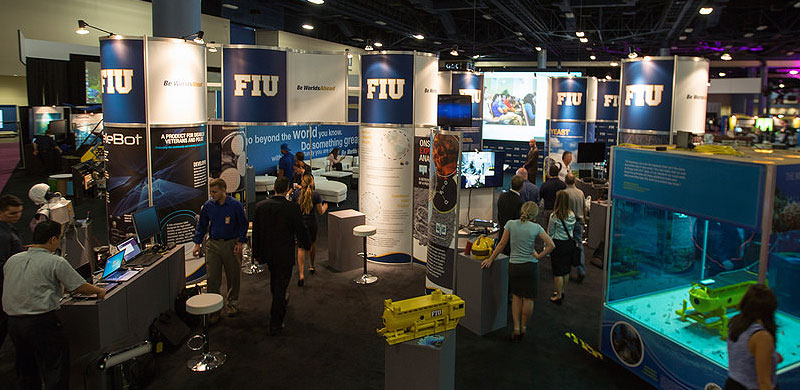
Frank Hernandez ’13 earned his bachelor’s, master’s and doctoral degrees in computer science at FIU. It’s not a stretch to think he would be a proud FIU Panther.
Turns out he wasn’t. That is, not until this week, when he attended the inaugural eMerge Americas Techweek conference on Miami Beach and became aware of the breadth and scope of FIU research being conducted at his alma mater.
“To see all of this makes me really proud,” he said, gesturing at the exhibits in the FIU expo. “Now.”
Hernandez, the founder of Game Developers Guild, continued, “We always seemed to be in everyone else’s shadow. But not anymore.”
That seemed to be the prevailing sentiment among conference attendees. From President Mark B. Rosenberg’s co-hosting of a discussion on the use of innovation and tech in education reform, to the university’s spectacular exhibition space that provided a snapshot of FIU research, the university’s presence at the conference was impossible to ignore.
“What gets me the most when I see FIU’s presence here is how far we’ve come since 2001, when I first began attending,” said Michael Rojas ’12. “It’s now the school of the future.”
Worlds Ahead
Just beyond the exhibit wall that exhorted passers-by to “Think differently, go beyond the world you know. Do something great with the opportunity you are given,” people were having a conversation. But true to FIU’s DNA, it wasn’t just any conversation. It was FIU’s Roger Garcia and James Fourqurean, 60 feet below the surface of the ocean in the Medina Aquarius Reef Base, speaking with dozens of conference participants via a live feed. The two men are the director of operations and director of marine education and research initiatives, respectively, of the world’s only undersea research laboratory. These conversations took place steps away from live demonstrations of the Discovery Lab’s Telebot and presentations of Ranu Jung’s prosthetic arm and Malek Adjouadi’s brain mapping research. Researchers and students working on these projects and more answered questions from attendees eager to learn more.
“I left the first day with a pocket full of business cards,” said Joel Villasuso, a sophomore majoring in computer engineering. Villasuso helped develop the arm system of the Telebot and served as the “driver” for the demonstrations, directing the robot’s hand movements. “People are interested both in the technology and in the robot for use in their businesses.”
Saman Sargolzaei, a doctoral candidate, and Mercedes Cabrerizo, both of whom work in Adjouadi’s lab on brain mapping, said their work attracted a great amount of interest.
“One woman was deeply affected when she saw our display,” said Cabrerizo. “She has a niece in eighth grade who has epilepsy. She wanted to learn more. We had another woman who was here from Argentina ask to visit our lab. She uses this equipment but for something different than we do.”
Sargolzaei spoke of a company CEO who expressed interest in working with the FIU group to test the efficacy of an epilepsy drug he is developing.
The opportunity to make new connections was a huge draw for FIU researchers and students, who often spend their days in the lab, immersed in their work.
“How can we use fiber optics in our cables? How can we use alternative energy?” said Tom Potts, Medina Aquarius Reef Base program director. “We know how to dive, trust me. But our presence at a conference like this allows us to explore some of the changes in technology that could help us do what we do better. It also gives us an opportunity to showcase our facility to other companies that might have a need for it. We’re thrilled to be here.”
Innovation and tech in education reform
On Tuesday, May 6, Rosenberg co-hosted a discussion together with J.P. Morgan’s head of U.S. Southeast Private Bank Phil Conway and Florida State Rep. Erik Fresen on the use of innovation and tech in education reform. Conway opened the discussion by, in his own words, “being a bit provocative”: “There are lot of articles out there that say education today is failing us. So what is FIU doing?”
Rosenberg responded, in part, by saying, “Universities are capable of disrupting ourselves” and pointing out that at FIU, “We have a lot of leaders who want to shake things up.” The two men spoke at length about the successful collaboration between FIU and J.P. Morgan in The Education Effect. Since 2011, with a seed investment from JPMorgan Chase, FIU has worked in collaboration with Miami-Dade County Public Schools to improve student achievement, increase graduation rates and promote a pathway to post-secondary education.
“As a public institution, we have to make a decision every day on whether or not we’re going to have an impact on this community,” said the president. “We have choices. We can curse the darkness and move on or turn into it and figure it out. We did just that with the Education Effect.”
All three men were in agreement that the allocation of resources must be more intentional than in years past. With every dollar the Legislature spends, Fresen said, legislators must ask themselves, “Will this initiative help us meet the needs of the 21st century?”
FIU’s new collaboration with University of Central Florida and University of South Florida is aiming to do that. So, too, is the university’s push to increase the number of available internships to students.
“We can’t get that done, however, unless we have buy-in from the private sector,” said Rosenberg.
source: https://cec.fiu.edu/2014/05/fiu-establishes-impressive-presence-at-tech-conference/
